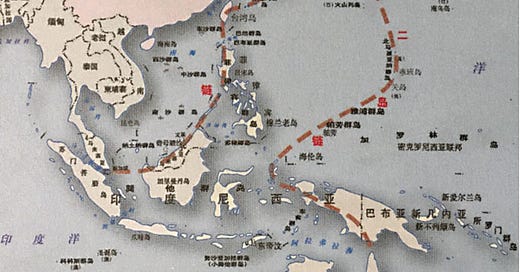Cleo Paskal and the PRC in the Pacific Islands - on Midrats
China did not wait for us to pay attention
What has the People’s Republic of China been doing to grow its influence in the Pacific Island nations that proved so crucial in the Pacific theater in WWII, and will be just as important for the next Great Pacific War?
Our guest for the full hour is be Cleo Paskal.
Cleo is Non-Resident Senior Fellow focusing on the Indo-Pacific at the Foundation for Defense of Democracies. She has testified before Congress multiple times and regularly lectures for seminars for the U.S. military. She is also a columnist with India's The Sunday Guardian newspaper. She is surprisingly short, but as this is a podcast, no one will notice.
You can listen here or on Spotify below:
Showlinks:
Protecting the Corridor of Freedom to America’s Asian Border, by Cleo Paskal. Published July 1, 2024 in Journal of INDO-PACIFIC Affairs.
Island-Hopping with Chinese Characteristics—What the PRC Is Island-Hopping with Chinese Characteristics, by Cleo Paskal. Published in the Autumn 2023 edition of the Naval War College Review.
Chinese Lessons From the Pacific War: Implications for PLA Warfighting, by Toshi Yoshihara. Published January 5, 2023 at Center for Strategic and Budgetary Assessments.
The Compacts of Free Association report by the Congressional Research Service, April 2024.
Summary:
The conversation discusses China's growing influence in the Pacific Island nations and its comprehensive national power strategy. The Pacific Island nations, located between Hawaii and Guam, are strategically important for the US. China's comprehensive national power metric ranks countries based on various factors, including economic, military, and political influence. China's approach is externally focused and aims to increase its own power while decreasing the power of other nations. The Chinese Communist Party's influence extends beyond government and includes economic, social, and criminal elements. The US and its allies need to be aware of China's grand strategy and its impact on the Pacific region. The principal themes of the conversation are the importance of addressing corruption in the Pacific Islands, the strategic significance of the Pacific region, the need for maritime domain enforcement, and the role of the US in supporting the Pacific Islands.
Takeaways:
China is actively growing its influence in the Pacific Island nations, which are strategically important for the US.
China's comprehensive national power metric ranks countries based on various factors and aims to increase China's power while decreasing the power of other nations.
China's approach is externally focused and includes economic, social, and criminal elements.
The US and its allies need to be aware of China's grand strategy and its impact on the Pacific region. Corruption in the Pacific Islands is a major issue that needs to be addressed, as it undermines national security and allows China to gain influence in the region.
The Pacific region is strategically significant, and control over the islands and maritime routes is crucial for both the US and China.
Maritime domain enforcement is essential to protect the rights and interests of the Pacific Islands and to counter illegal activities by China.
The US should provide support to the Pacific Islands in terms of intelligence sharing, investigations, and strengthening their legal systems to combat corruption and defend their communities.
The US needs to increase its presence and engagement in the Pacific Islands to counter China's influence and protect its own interests in the region.
Sound Bites:
"If you have a Pacific centered map, you know, the Indo-Pacific is going to be the, to the 21st century, what the Atlantic was to the 20th century."
"China's comprehensive national power mentality seems to have actually translated into action in the way that they interact with the region."
"China's approach is not just a kind of zero-sum game. They will go into the negative if the other side loses more."
"We are actually in a position where you're way better off sending a special prosecutor or some really good district attorney, resident investigators than you are sending in the [USNS} Mercy or Coast Guard cutters because whatever corruption that's happening on the ground is what's feeding out into the maritime environment, the air environment, and the entire national security bubble and corroding it."
"We should have an unlimited prosecution and investigation budget. You don't compete on their terms, you compete on our terms because fundamentally, I think our system is better."
"Unless we raise the cost of taking the money from China and give breathing space to the people who are trying to defend their communities and the things that they believe, it's not going to tip in our favor."
Chapters:
00:00: Introduction and Call to Join the Conversation
02:10: Overview of the Pacific Island Nations
07:24: China's Comprehensive National Power Strategy
13:33: China's Influence in the Commonwealth of Northern Marianas
21:23: China's Braided Approach and Challenges for the US
32:18: The Corrosive Effect of Corruption on National Security
34:44: The Significance of the First and Second Island Chains
38:29: The Importance of Geography in Conflict
41:58: The Need for a Stronger US Presence in the Pacific Islands
47:14: China's Political Warfare in the Pacific Islands
53:22: China's Maritime Strategy in Latin America
56:20: Enforcing Maritime Domain Awareness in the Pacific Islands
59:41: The Importance of FBI Field Offices in the Pacific Islands




